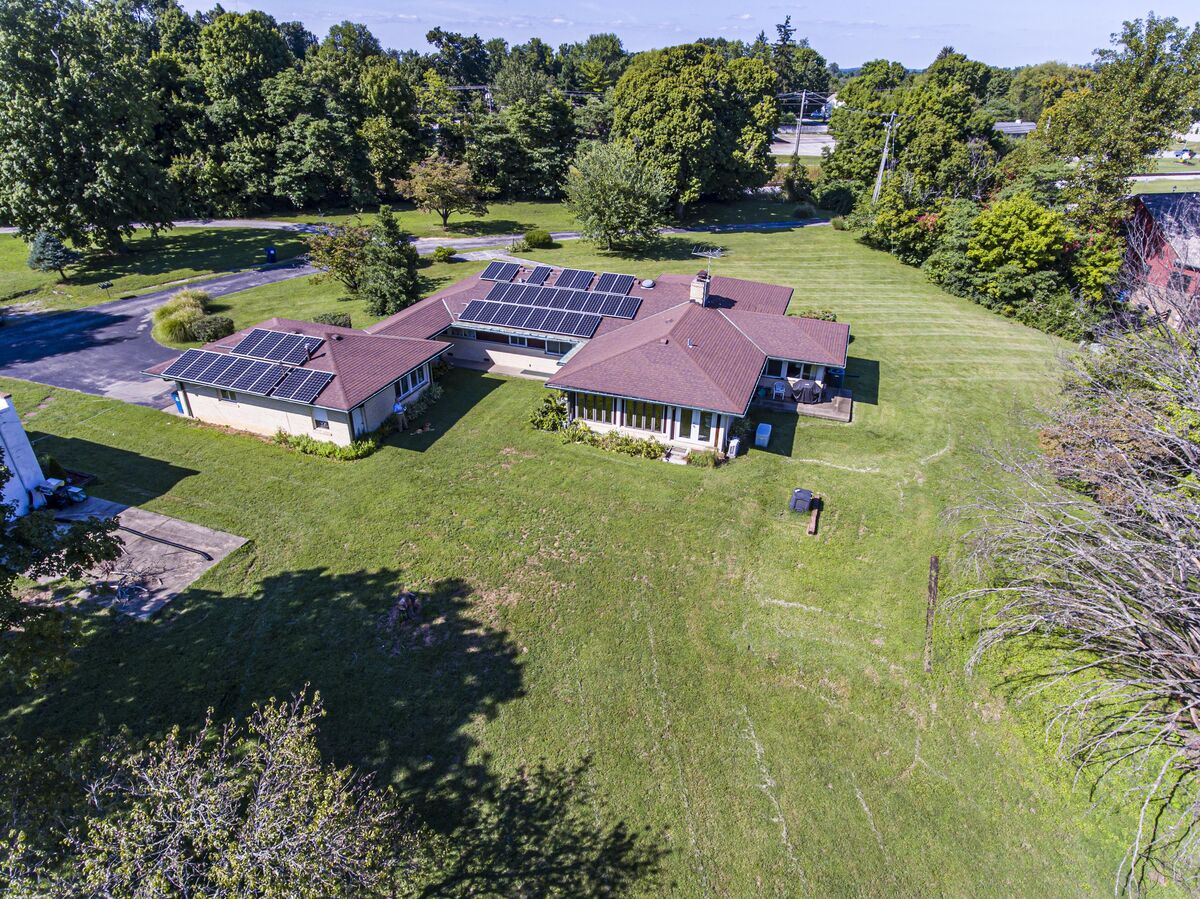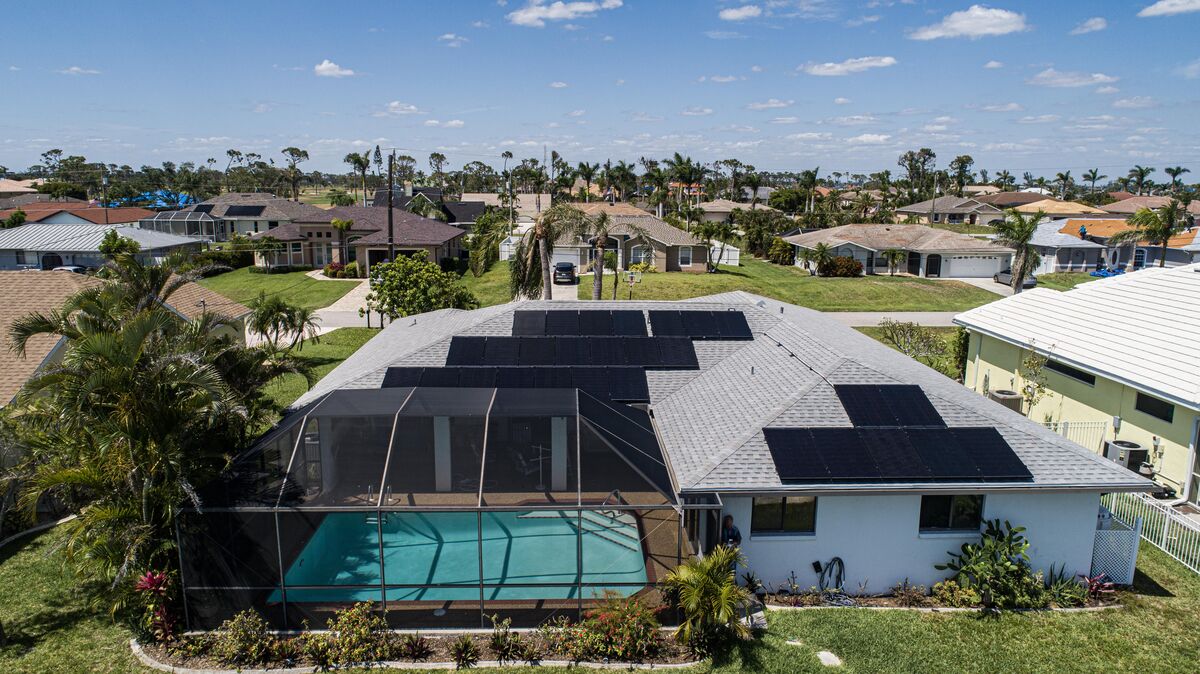Going solar- NOT
Jan 12, 2024 00:18:32 #
Robertski
Loc: So California
Texcaster wrote:
Our hot water is solar powered electric with mains back up, for days in a row of not much sun.
BTW - our heater lasted 30 years not 20 as I stated. It was a Solahart
BTW - our heater lasted 30 years not 20 as I stated. It was a Solahart

Thanks for the confirmation! Even though the sun heats the water directly which is more efficient, you also have an electric coil in the house tank if you need it. I was just looking for the best solar water heaters this morning and the Solahart came up and sounded impressive. I was also researching if any version would work on a sailboat as well as a house roof. One of the advantages of the solar water collectors is that they take up less space than PV panels to heat the same amount of water. Thank goodness my house doesn't swing around in circles. I'll start on the roof, if the home owners association will allow the additional slope that the tubes require to perform. They already want the PV panels to be flat with the roof slope even though a steeper slope would be better at my latitude.
Jan 12, 2024 06:56:31 #
scallihan wrote:
My energy provider increased our rates as of Jan 1... (show quote)
Good point.
I live in South Carolina and, maybe uniquely, one or our local utility companies will provide a free audit of solar savings calculations provided by third party installers.
Jan 12, 2024 07:54:43 #
Artcameraman
Loc: Springfield NH
If the government wants everyone to go solar then the government should provide the system to do it. But that's me. Cheers.
Jan 12, 2024 08:48:58 #
Artcameraman wrote:
If the government wants everyone to go solar then the government should provide the system to do it. But that's me. Cheers.
If the goverment wants everyone to go solar then simply build the power grid powered with solar.
Jan 12, 2024 13:18:56 #
dwmoar wrote:
In other words, you will never see that happen.
Eh! Could be Doc!

Jan 12, 2024 13:23:25 #
Texcaster wrote:
Our hot water is solar powered electric with mains back up, for days in a row of not much sun.
BTW - our heater lasted 30 years not 20 as I stated. It was a Solahart
BTW - our heater lasted 30 years not 20 as I stated. It was a Solahart

I owned a house for 20 years that had solar water heating and an extra large storage tank with gas backup for night and cloudy days. A big set of pipes on the roof in black glass to max out the heat and the water slowly circulated from the tank to the solar heater and back by a small pump.
On sunny days, the water we got was hotter than when the gas was heating it. After a while we learned to set the ratio of hot to cold on each faucet to fit sunny day, cloudy day or night.
Jan 12, 2024 14:26:57 #
robertjerl wrote:
I owned a house for 20 years that had solar water heating and an extra large storage tank with gas backup for night and cloudy days. A big set of pipes on the roof in black glass to max out the heat and the water slowly circulated from the tank to the solar heater and back by a small pump.
On sunny days, the water we got was hotter than when the gas was heating it. After a while we learned to set the ratio of hot to cold on each faucet to fit sunny day, cloudy day or night.
On sunny days, the water we got was hotter than when the gas was heating it. After a while we learned to set the ratio of hot to cold on each faucet to fit sunny day, cloudy day or night.
... and to suit summer or winter. At the moment we only need a small amount of hot to volumes of cold.
Jan 12, 2024 14:37:45 #
robertjerl wrote:
I owned a house for 20 years that had solar water heating and an extra large storage tank with gas backup for night and cloudy days. A big set of pipes on the roof in black glass to max out the heat and the water slowly circulated from the tank to the solar heater and back by a small pump.
On sunny days, the water we got was hotter than when the gas was heating it. After a while we learned to set the ratio of hot to cold on each faucet to fit sunny day, cloudy day or night.
On sunny days, the water we got was hotter than when the gas was heating it. After a while we learned to set the ratio of hot to cold on each faucet to fit sunny day, cloudy day or night.
And how did it perform on a -40°C day?
bwa
Jan 12, 2024 15:55:08 #
bwana wrote:
And how did it perform on a -40°C day?
bwa
bwa
In Southern California?!?!?!?
Even the walk in freezer at the supermarket where I worked my way through college, it was only at 0°F.
Jan 13, 2024 17:03:05 #
Every situation is different. I have solar in two homes. In Kentucky I have battery backup in Florida I do not. In Florida the solar just offsets the cost of electricity, about 7 years does it for me to break even. In Kentucky it took about ten years to break even but I didn't get solar there to save money I did it to keep the power on. Kentucky is my base and I have a couple freezers full of food I would not like to lose. When I first installed I got a huge battery that would keep the A/C going in the Summer. The batteries were fine but I traveled a lot and didn't care for them properly and ruined them. I have since replaced them with carefree batteries but at only one third the capacity so that they will only run the A/C in the summer for two or three days if we don't have a lot of sun. So to offset that need I got a couple mini split units that provide A/C or heat and they are really efficient. Now I can run them as long as I want on battery power but the area cooled is only the kitchen dining room (about 800 sqft) and our bedroom.
During the last Hurricane down in Florida I saw so any of my neighbors with their refrigerators on the street taped shut because of the spoiled food. My solar didn't help that but I did also have a little generator, 5500 watts that kept my lights, refrigerator and cook stove running. I had to be careful for a week or so waiting for power to be restored, the biggest hassle was getting gasoline from filling stations that didn't have power.
Anyway, in Kentucky most months I don't pay anything for electricity except for the hookup charge which is about $25 a month. In Kentucky what overage I generate during the day comes back to me at night and at the end of the year they give me a credit and I start all over again. In Florida they simply buy my excess electricity at wholesale rate of about 2-1/2 cents, not worth the trouble of keeping up with it.
The advantage of battery backup of course is that when the grid is down you aren't. It's automatic and you never even realize it. I've had neighbors ask me when the power came back on because theirs wasn't but I didn't even know it went off.
I'm old and my wife is several years younger so I wanted monthly expenses to be as small as possible when I'm gone. I just lived longer than expected so that I get to enjoy those reduced monthly expenses too.
I really like my solar and am glad I have it. Electricity costs may go up but it won't affect me.
During the last Hurricane down in Florida I saw so any of my neighbors with their refrigerators on the street taped shut because of the spoiled food. My solar didn't help that but I did also have a little generator, 5500 watts that kept my lights, refrigerator and cook stove running. I had to be careful for a week or so waiting for power to be restored, the biggest hassle was getting gasoline from filling stations that didn't have power.
Anyway, in Kentucky most months I don't pay anything for electricity except for the hookup charge which is about $25 a month. In Kentucky what overage I generate during the day comes back to me at night and at the end of the year they give me a credit and I start all over again. In Florida they simply buy my excess electricity at wholesale rate of about 2-1/2 cents, not worth the trouble of keeping up with it.
The advantage of battery backup of course is that when the grid is down you aren't. It's automatic and you never even realize it. I've had neighbors ask me when the power came back on because theirs wasn't but I didn't even know it went off.
I'm old and my wife is several years younger so I wanted monthly expenses to be as small as possible when I'm gone. I just lived longer than expected so that I get to enjoy those reduced monthly expenses too.
I really like my solar and am glad I have it. Electricity costs may go up but it won't affect me.
Jan 14, 2024 06:01:07 #
From my experience (U.K.), I'd shell out for extra batteries to keep all the power you generate in the sunnier months. It's what I SHOULD have done.
Jan 14, 2024 14:03:13 #
therwol
Loc: USA
John N wrote:
From my experience (U.K.), I'd shell out for extra batteries to keep all the power you generate in the sunnier months. It's what I SHOULD have done.
Did you actually install solar on your house? I've spent a lot of time in the UK. I will admit that I saw the sun over there on occasion. September of 2009 was particularly sunny and warm, not to be duplicated on any of my other trips. On the other hand, most days were either rainy or cloudy. Here in California, we get blazing sun for about 8 months out of the year, which makes solar practical. Having battery backup isn't a panacea during the rainy months. Depending on how many batteries you install, you will get a few hours to a few days to power your house, and they kick in during power outages. They are also expensive and not necessarily cost effective. A cheaper generator usually makes more sense. I determined that it isn't worth the expense of batteries where I live. If I lived in the high mountains and had to deal with extended power outages because of massive snowfalls, I might reconsider, but a generator seems like a more cost effective answer.
Jan 14, 2024 14:22:37 #
We did, if I remember I'll take a shot tomorrow, but we have 12 panels + 3x 2.5kw batteries.
Our house is on a N.W. - S.E. orientation and works very well in the Summer often outputting more than 4.5kw.
Not so good in the Winter as we are at a latitude similar to Calgary (Canada) and that combined with the weather will reduce output to almost nothing. The sun came out for a short while today and we maxed at 2.5kw. Consumption today (up to 19:20 GMT) 12.2kw consumed of which 3.7kw came from solar.
Just noticed the Google car went by whilst the scaffolding was still up. My neighbour has a larger area of panel but they are less efficient and generate less. He's also had them a no. of years and with the feed-in tarrifs paid at the time he installed they have paid all costs.
Our house is on a N.W. - S.E. orientation and works very well in the Summer often outputting more than 4.5kw.
Not so good in the Winter as we are at a latitude similar to Calgary (Canada) and that combined with the weather will reduce output to almost nothing. The sun came out for a short while today and we maxed at 2.5kw. Consumption today (up to 19:20 GMT) 12.2kw consumed of which 3.7kw came from solar.
Just noticed the Google car went by whilst the scaffolding was still up. My neighbour has a larger area of panel but they are less efficient and generate less. He's also had them a no. of years and with the feed-in tarrifs paid at the time he installed they have paid all costs.

Jan 14, 2024 17:14:56 #
therwol wrote:
Did you actually install solar on your house? I'v... (show quote)
Batteries are not cost effective, but if the grid is down for more than several days or even weeks your generator won't hold up and you will only be able to run it a few hours a day. The other problem is fuel. If the grid is down filling stations are not going to be open and how dependable will natural gas be if everyone is using it and there is no electricity. You can only store so much gasoline. If the grid is down for a long time I'm in a good position with 12KW on the roof. I average anywhere between 25 and 40KW a day usage without regulating my usage. Without A/C I can easily get down to 20 or below, my system will handle that even considering several days without sun. If it really gets bad I can run the 16KW generator for about 4 hours and get two days of battery out of it. I can usually get 20KW a day even in overcast skies. Rain, not so much but rain in Kentucky is not like England. I lived in Scotland for a few years and it was nearly always overcast. In that case you need to have twice to three times as much solar as you think you will need. Calculate about 35% of your panels in collected electricity. If you have a 200 watt panel figure your only going to get about 70 watts out of it best case for overcast days. I have 4, 48 volt banks of volt batteries giving me about 1100 amps. That sounds like a lot but it isn't. It is best to not run your batteries down any lower than you have to I prefer staying well above 50% which means if I am using battery I have to carefully manage my usage. No more leaving wall warts plugged in, no more using night lights or leaving any lights on all the time. All my lighting is now LED which has made a huge difference in usage but the freezers and A/C are the big energy hogs. I can do without A/C in summer but I need heat in Winter. I have a gas boiler, a forced air heat pump and two heat/cool mini splits. In the winter on battery power as long as there is natural gas I will use the boiler and just run the circulation pumps. If not super cold I will just run one mini-split at night.
If I had it to do all over again I would put more than the 36 panels I have and double my battery storage. I think 15KW would have been better than the 12 I have. But I usually don't have a bill above my minimum except in the hot summer A/C season.
One thing to realize that you never get what you put on the roof. You must figure a good 10% reduction in wiring losses. If you don't use battery backup you will have less loss than 10% but after ten years I have seen a reduction in what I can pull down. If it is a good day if I can get 10KW per hour or 60KW a day. If you have a battery you are only going to get about 90% of what you put in to the battery back out.
With plenty of sunshine I don't have to be stingy with usage but with overcast which is often the case in Kentucky in the winter I must be careful if using the battery instead of the grid.
I'm glad I have the solar, my monthly electricity cost are very low at both houses and I feel prepared if the you know what hits the fan and the grid is down for a long time.
There are a lot of things that are not cost effective, solar is one of them but to me security is worth the price of solar.
The picture below with the brown roof is in Kentucky, the house with the pool is in SW Florida where the sun always shines. I have added a few KW more panels since that picture of the Florida house was taken. We use a pool heater, although it is a heat pump heater it still uses a lot of electricity and I would rather generate it than pay for it.


Jan 14, 2024 19:30:21 #
My wife and I decided not to as our property is very shaded, but I thought the energy companies HAD to, by law, buy back unused power. It's just that they can pay you less for it than if you bought a kilowatt hour, and it would be a credit towards future energy purchases. Also, the panels will add some value to the house, which has nothing to do with dollars earned from the power company.
If you want to reply, then register here. Registration is free and your account is created instantly, so you can post right away.



